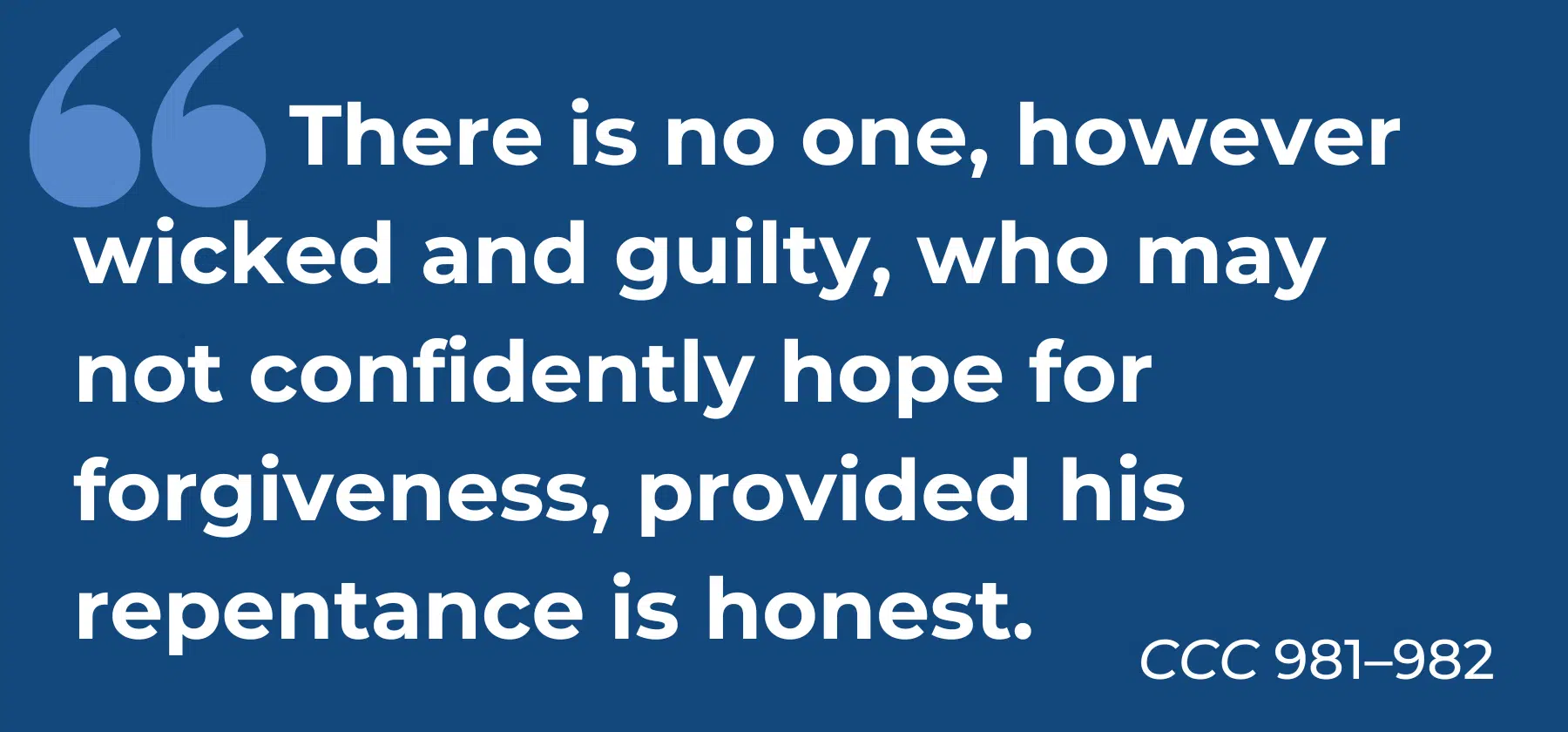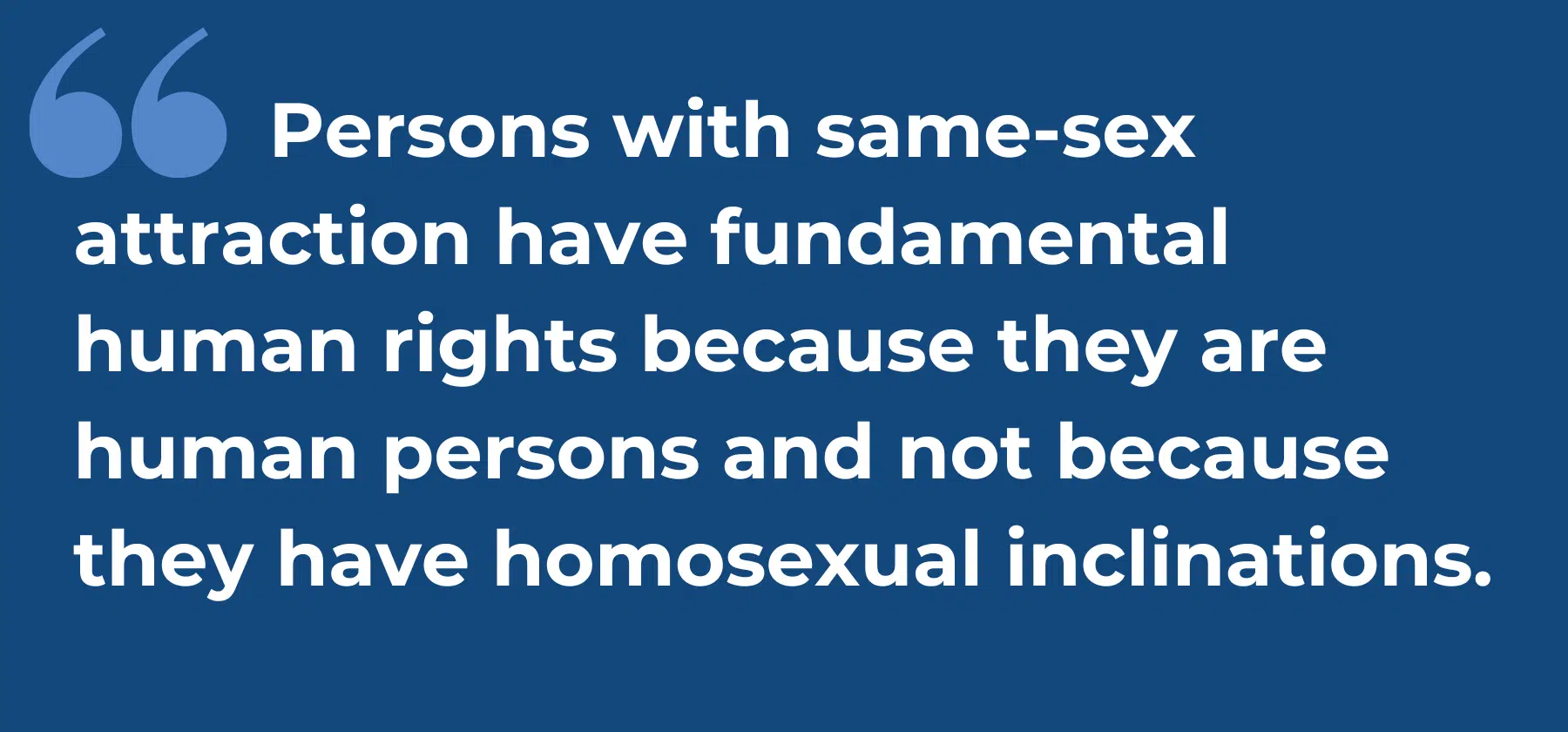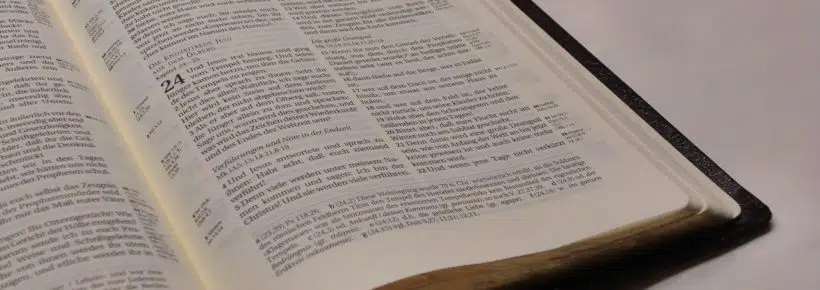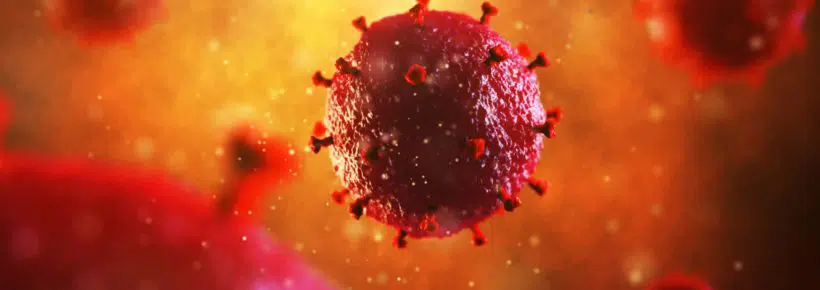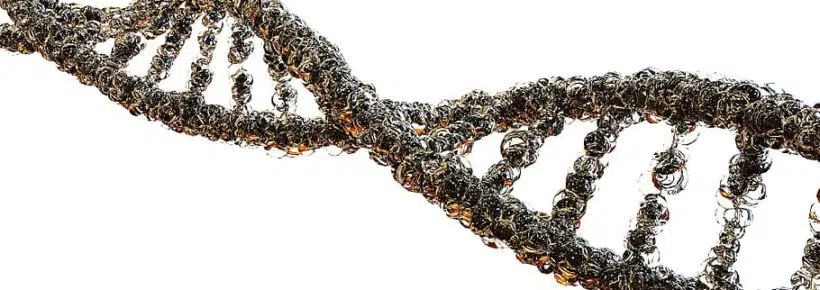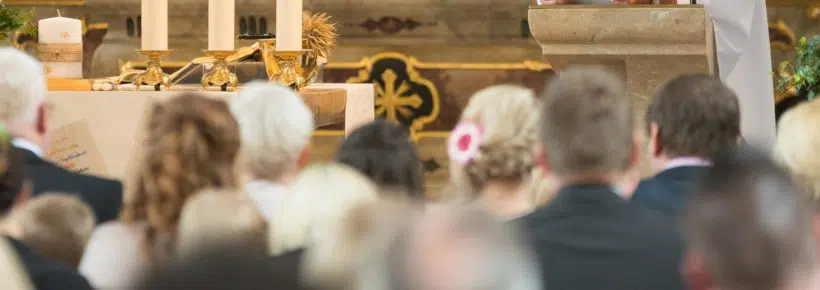The title of our article needs an important clarification, which we shall develop further below. “Homosexuality” denotes a sexual attraction towards members of the same sex. As such it is not a sin. Only homosexual acts are gravely sinful. But God does forgive those acts, provided the sinner is truly repentant. In fact, the Catechism of the Catholic Church (CCC) clearly teaches:
There is no offense, however serious, that the Church cannot forgive. There is no one, however wicked and guilty, who may not confidently hope for forgiveness, provided his repentance is honest. Christ who died for all men desires that in his Church the gates of forgiveness should always be open to anyone who turns away from sin. (981–982)
Having laid out these foundational remarks, we have the following points of inquiry:
- Church teaching about homosexual acts
- Subjective guilt vs. objective evil
- Homosexual attraction vs. homosexual acts
- Condemning the sin but not the sinner
- How the Church helps persons with same-sex attraction (SSA)
- The Church on violence against persons with SSA
- Persons with SSA and fundamental human rights
- How Catholics should treat persons with SSA
What Does the Church Teach about Homosexual Acts?
The Catholic Church, reflecting on the Word of God in the Bible and Sacred Tradition and on the natural law, under the guidance of the Holy Spirit, has always taught that homosexual acts are intrinsically and gravely evil. In 1975, The Sacred Congregation for the Doctrine of the Faith declared:
According to the objective moral order, homosexual relations are acts which lack an essential and indispensable finality. In Sacred Scripture they are condemned as a serious depravity and even presented as the sad consequence of rejecting God. See Romans 1:24-27; I Cor 6:10; I Tim 1:10. (Declaration on Certain Questions Concerning Sexual Ethics, no. 8)
This means that homosexual acts are intrinsically disordered because they lack the two intrinsic goods (or values) that God has inscribed in human sexuality: heterosexual conjugal union and openness to life. They are gravely evil because those goods are very valuable.
The perspective of right reason or the natural law, which affirms the unity of the human person as a being intrinsically (not accidentally) composed of body and soul, confirms this teaching of Scripture and of the Catholic Church. The body is intrinsic to the human person. It is part of what it means to be a human being. Therefore, we can say that the body expresses the person, what the person is: an embodied human spirit or a spiritualized body. Therefore, the body also expresses who the person is in his or her sexual identity: a man or a woman.
Furthermore, a simple observation demonstrates that men and women are complementary, especially, although not only, through their bodies. It also demonstrates that only through their natural sexual union, within the context of marriage as created and instituted by God Himself, is human life adequately transmitted (see Gen. 1:26-28; 2:24; Matt. 19:3-9).
Homosexual “unions” do not really unite two persons, two men or two women, since they lack complementarity. Those “unions” are also intrinsically deprived of the power to transmit life within the context of a true marriage. A man and a woman united in marriage can be, through no fault of theirs, unable to have children. But this incapacity arises by reason of an infertility problem (which sometimes can be healed), and not by an intrinsic impossibility, as in the case of same-sex couples.
Related: What Does the Catholic Church Teach about Homosexuality?
Subjective Guilt and Objective Evil
Given what we have discussed, one might ask whether persons with SSA always act with an evil intention.
The harsh condemnation of homosexual acts we find in the Bible does not mean that the persons who engage in those acts are always subjectively guilty. In other words, such persons may not be guilty of sin in the eyes of God because they may not be aware that their actions are sinful. Regarding this point, the same Church document just cited adds in the same paragraph:
This judgment of Scripture does not of course permit us to conclude that all those who suffer from this anomaly are personally responsible for it, but it does attest to the fact that homosexual acts are intrinsically disordered and can in no case be approved of.
Here the Church is making the distinction between the homosexual act itself, which is always intrinsically disordered, and the subjective guilt of the person who engages in it. Bad example, bad teaching to children from adults, traumatic sexual exploitation, and other factors indeed render such guilt nil or diminish it. Let us recall that for there to be a mortal sin, not only must the act itself be gravely evil, but also the person must be fully aware of this fact, and he must freely consent to the action.
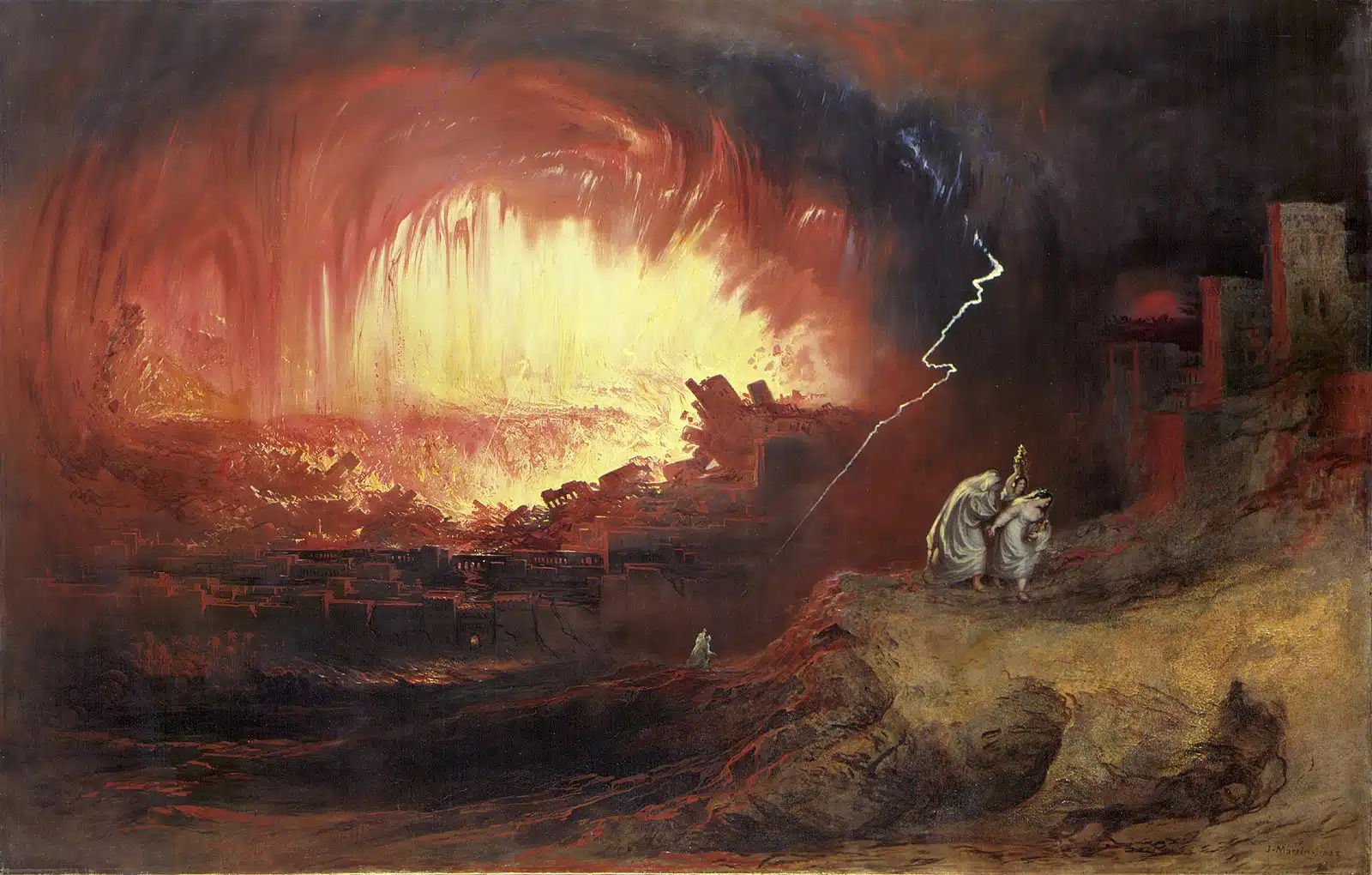
Sodom and Gomorrah ~ John Martin
Each case must be evaluated in its interior dimension. That is the job of pastoral agents, be they mature lay persons or priests, all of whom must be completely faithful to the authentic teaching of the Church.
Homosexuality vs. Homosexual Acts
The Church also distinguishes between a homosexual inclination (sometimes called “homosexuality”) and a homosexual act.
The former is not a sin. However it does incline the person to acts which are indeed objectively disordered. This is why in its 1986 Letter to the Bishops of the Catholic Church on the Pastoral Care of Homosexual Persons, the Sacred Congregation for the Doctrine of the Faith clarified, “Although the particular inclination of the homosexual person is not a sin, it is a more or less strong tendency ordered toward an intrinsic moral evil; and thus the inclination itself must be seen as an objective disorder.” (3)
Homosexuality in and of itself is not a sin but an objective disorder because it inclines the person to commit a grave sin. The homosexual act is indeed a grave sin. However, if the person with SSA resists his or her inclination to sin, whether in thought* or act, that person has not only avoided sin but has indeed performed the virtuous act of chastity and should be commended and pastorally supported in his or her decision.
*Note: when we refer to a sin of thought, we are not referring to a fleeting act of the imagination, which is immediately rejected, but to a fully accepted evil thought.
Condemn the Sin, Be Merciful to the Sinner
This was precisely the attitude of Jesus himself. Recall John 8:3-11. Jesus was confronted by a mob of self-righteous hypocrites who wanted to stone to death a woman caught in adultery. Jesus responded by telling them that he who was without sin may cast the first stone. Feeling ashamed, they left one by one. Then Jesus told the woman that he did not condemn her, but to go and sin no more.

The Woman Taken in Adultery ~ Guercino
Jesus showed a perfect balance between recognizing the ugly and serious sin of adultery and at the same time showing the woman his infinite willingness to forgive her provided she sincerely repented, then commanding her not to sin anymore.
We can apply this approach to the topic at hand. We must always recognize the intrinsic and grave evil of homosexual acts, yet, at the same time, we must humbly show the sinner that God and His Church are always ready to forgive him or her provided there is true repentance.
Unfortunately, today there are many lay persons and even priests and bishops who not only dismiss the gravity of homosexual acts but are willing to embrace persons who are engaged in those acts without any repentance. This seems to be the attitude of the high-profile priest James Martin, SJ, among others.
How the Church Helps Persons with SSA
The Church offers reconciliation and healing to repentant persons who have engaged in homosexual acts through the Sacrament of Penance, which is absolutely necessary to receive Communion and attain salvation. But the Church also offers pastoral help and support to these brothers and sisters of ours so that they can live chaste lives.
The well-known and faithful ministry Courage offers individual pastoral and spiritual guidance, as well as group support and accountability. We should all support this beautiful ministry with our prayers and sacrifices.
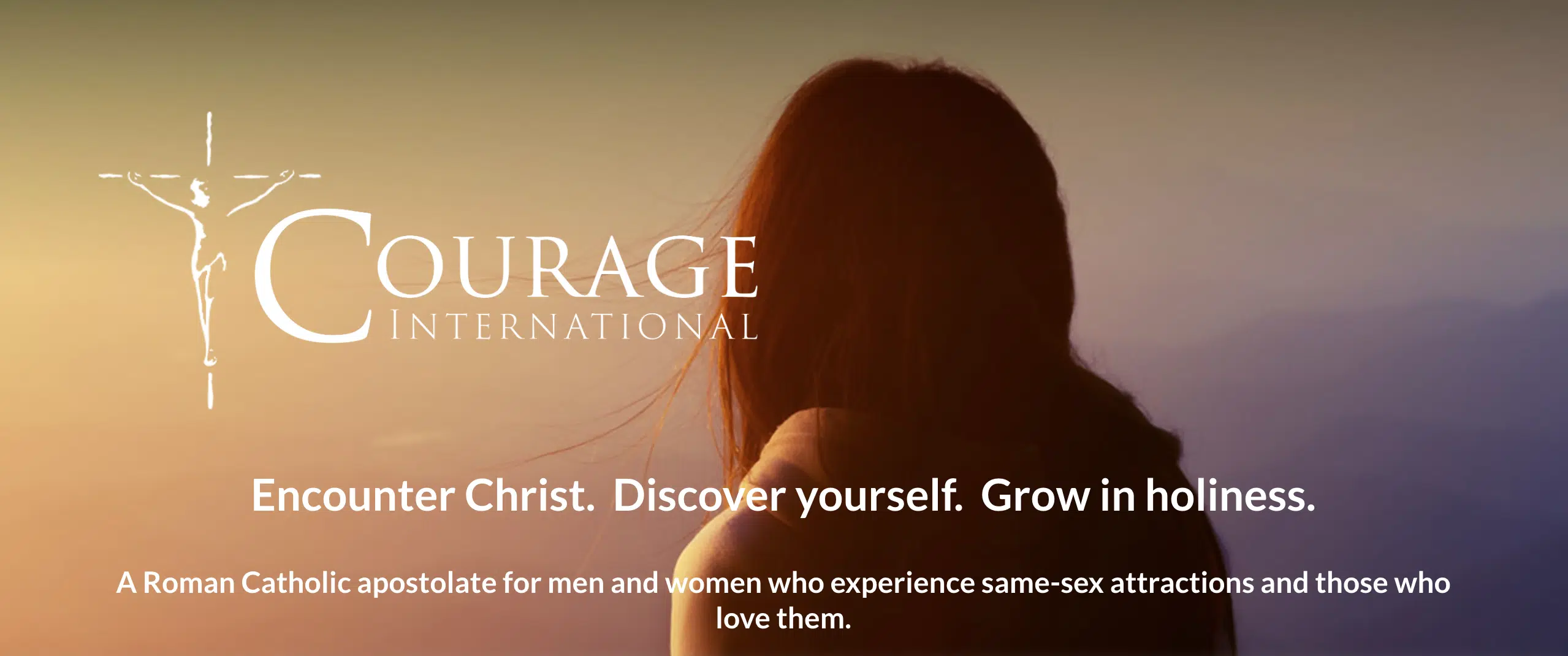
From the website of Courage International
Does the Church Condemn Violence Against Persons with SSA?
The Church does not mince words when it condemns any type of violence, verbal or physical, against persons with SSA attractions or even those who have fallen into homosexual acts.
In its 1986 Letter to the Bishops of the Catholic Church on the Pastoral Care of Homosexual Persons (quoted above), no. 10, the Sacred Congregation for the Doctrine of the Faith teaches:
It is deplorable that homosexual persons have been and are the object of violent malice in speech or in action. Such treatment deserves condemnation from the Church’s pastors wherever it occurs. It reveals a kind of disregard for others which endangers the most fundamental principles of a healthy society. The intrinsic dignity of each person must always be respected in word, in action and in law. (10, emphasis added)
Notice that the document reaffirms the intrinsic dignity of all human persons, which, of course, includes persons with SSA. This important point leads us to the next consideration:
Do Persons with SSA Have Fundamental Human Rights?
From this previously quoted document and many others, we can unequivocally affirm that the Catholic Church teaches that from the moment of his or her conception, every human person has been endowed by God with an intrinsic and absolute dignity or self-worth. This is true whether the person today is the greatest of sinners or the greatest of saints.
We are speaking here of ontological dignity, not of moral dignity. The former refers to the value each human person has in his or her being (ontological), that is to say, by the mere fact that he or she is a human person. The latter depends on the person’s attitudes and behaviors. Obviously, Saint Mother Teresa and the evil tyrant Fidel Castro did not have the same moral dignity, but they had the same ontological dignity.
The Church also teaches that fundamental human rights are derived from a person’s (ontological) dignity (see CCC 1930). Therefore, persons who have SSA also have fundamental human rights, like everyone else.
But here an important distinction must be made. Persons with SSA have fundamental human rights because they are human persons and not because they have homosexual inclinations. The human person is a source of fundamental human rights, not homosexuality or homosexual acts. No sin can be a source of rights. On the contrary, oftentimes sins are sources of attacks on human rights. The primary example is, of course, abortion.
The 1992 document of the Sacred Congregation of the Doctrine of the Faith titled Considerations Concerning the Response to Legislative Proposals on the Non-Discrimination of Homosexual Persons teaches:
10. “Sexual orientation” does not constitute a quality comparable to race, ethnic background, etc. in respect to non-discrimination. Unlike these, homosexual orientation is an objective disorder and evokes moral concern.
11. There are areas in which it is not unjust discrimination to take sexual orientation into account, for example, in the placement of children for adoption or foster care, in employment of teachers or athletic coaches, and in military recruitment.
12. Homosexual persons, as human persons, have the same rights as all persons including the right of not being treated in a manner which offends their personal dignity. Among other rights, all persons have the right to work, to housing, etc. Nevertheless, these rights are not absolute. They can be legitimately limited for objectively disordered external conduct. This is sometimes not only licit but obligatory. (10–12)
How Should Catholics Treat Persons with SSA?
Catholics should always treat these persons with love and respect. Some of these persons might be hostile in words or actions against anyone who disagrees with their ideology. In those cases, Catholics have the right to distance themselves from them, but must continue to pray for them.
Catholics, especially parents, have the right and duty to protect their children from pro-homosexual indoctrination in the schools or other educational or social settings. In such cases, Catholics should form associations with other pro-family persons, Catholic or not, to have their rights known and protected. They also have the right and duty to withdraw their children from those schools or educational and social settings unwilling to respect their rights as parents.
However, in all the above cases, we should follow the teachings of Jesus to pray and bless these people so that they stop harming children and society and that they may convert to Christ and His Catholic Church.
When coming into contact with persons with SSA who are not violent or who even show an interest in coming to know the truth, we should always approach them with love and acceptance as persons loved by God. We should gently and lovingly share the truth about themselves as persons, male or female, created in the image of God. We should tell them that God loves them infinitely and sent His Son to give his life for them and for us. We should also tell them that all of us are sinners too and that we all need healing and reconciliation. We all have problems, some in some areas others in other areas. And nobody has the right “to cast a stone” at anybody else.
Finally, when the moment is right, we should invite them to repentance and to receive the Sacrament of Confession. We should also let them know that we support them all the way through in this process.
If they reject our approach, we should let them know that our “door” will remain open whenever they change their minds, and that we will continue to pray for them.
May we always approach all homosexual persons with both truth and love.
Related Content
Adolfo is the Director of Education for Hispanic Outreach for Human Life International and of HLI's Hispanic outreach arm Vida Humana Internacional. He has a Masters in Theology from St. Vincent de Paul Regional (Major) Seminary and a License in Moral Theology from the Alphonsian Academy in Rome.
Adolfo has traveled frequently to VHI’s affiliates in Latin America to give talks, training sessions, and media interviews. He has authored and co-authored books, articles, reports, and a pro-life training course for Hispanics in the U.S. Adolfo has also participated in the production of two TV pro-life series in Spanish, which have been aired through EWTN en Español.


